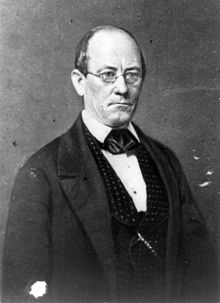John Letcher
| John Letcher | |
|---|---|
 |
|
| Member of the U.S. House of Representatives from Virginia's 11th district |
|
|
In office March 4, 1851 – March 3, 1853 |
|
| Preceded by | James McDowell |
| Succeeded by | John F. Snodgrass |
| Member of the U.S. House of Representatives from Virginia's 9th district |
|
|
In office March 4, 1853 – March 3, 1859 |
|
| Preceded by | James F. Strother |
| Succeeded by | John T. Harris |
| 34th Governor of Virginia (Disputed from 1861) | |
|
In office January 1, 1860 – January 1, 1864 |
|
| Lieutenant | Robert Latane Montague |
| Preceded by | Henry A. Wise |
| Succeeded by | William Smith |
| Member of the Virginia General Assembly | |
|
In office 1875–1877 |
|
| Personal details | |
| Born |
March 29, 1813 Lexington, Virginia, US |
| Died | January 26, 1884 (aged 70) Virginia, US |
| Resting place |
Stonewall Jackson Memorial Cemetery Lexington, Virginia |
| Political party | Democratic |
| Spouse(s) | Susan Holt |
| Profession | Politician, Lawyer, Journalist |
John Letcher (March 29, 1813 – January 26, 1884) was an American lawyer, journalist, and politician. He served as a Representative in the United States Congress, was the 34th Governor of Virginia during the American Civil War, and later served in the Virginia General Assembly. He was also active on the Board of Visitors of Virginia Military Institute.
John Letcher was born in the town of Lexington in Rockbridge County, Virginia. He attended private rural schools and Randolph-Macon College in Boydton, Virginia (later relocated to Ashland, Virginia). In 1833, he was graduated from Washington Academy in Lexington. He studied law, was admitted to the Virginia State Bar, and opened a practice in Lexington in 1839.
Letcher was editor of the (Shenandoah) Valley Star newspaper from 1840 to 1850. He was active in the presidential campaigns of 1840, 1844, and 1848, serving as Democratic elector in 1848. Although never a true abolitionist, he signed the Ruffner Pamphlet of 1847, which proposed the abolition of slavery in that part of Virginia west of the Blue Ridge Mountains; however, he soon repudiated this antislavery stand. He was a delegate to the Virginia Constitutional Convention of 1850.
He was elected as a Democratic candidate and served as a Representative in the United States Congress from 1851 to 1859. In Congress, he was known as "Honest John" because of his opposition to government extravagance.
...
Wikipedia
